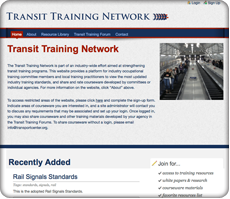News
System of Training and Qualifications for Rail Vehicle Technician Starts Pilot Stage
Posted November 2012
As System of Training and Qualifications for Rail Vehicle Technician Starts Pilot Stage, Center Examines the Future of Transit Training Funding
Over the past five years the Transportation Learning Center has been assisting the transit industry in building a national qualification system for rail vehicle maintenance technicians under the auspices of Transit Cooperative Research Program Project E-7. The complete system includes national training standards, an apprenticeship program, an online learning information management system, written and hands-on assessment tools and a database of sharable training materials along with best practices gathered from practitioners throughout the industry.
The project has now reached the critical point where all the pieces are ready for demonstration and validation in the field. Transit training sites are being chosen and Center staff are working with local training programs to pilot the qualification system. The E-7 project will end during 2013 with the introduction of a completed comprehensive system for the training and qualification of rail vehicle maintenance technicians. The end of the E-7 project does not however end the need for a railcar maintenance training program committee. The national qualification program will continue to develop training materials, refine processes and update written questions and hands-on assessment scenarios.
Sustaining a national system will require future funding and participation from transit agencies. With scarce resources and the propensity for training funds to be among the first budget casualties, the question arises as to how future training needs will be met. MAP-21 the latest iteration of the surface transportation act contains a section that reads (bolding added):
In General- the Secretary may undertake, or make grants and contracts for, programs that address human resource needs as they apply to public transportation activities. A program may include:
(1) an employment training program;
(2) an outreach program to increase minority and female employment in public transportation activities;
(3) research on public transportation personnel and training needs; and
(4) training and assistance for minority business opportunities.
This may provide some much needed funds to continue the rail vehicle maintenance training program work in the form of a consortium of interested transit agencies just as some have done for elevator and escalator maintenance training. The elevator/escalator consortium is funded through a cost sharing agreement between the Federal Transit Administration and the participating transit agencies. The return-on-investment for quality training has proven to be substantial. The industry cannot afford to ignore it.
